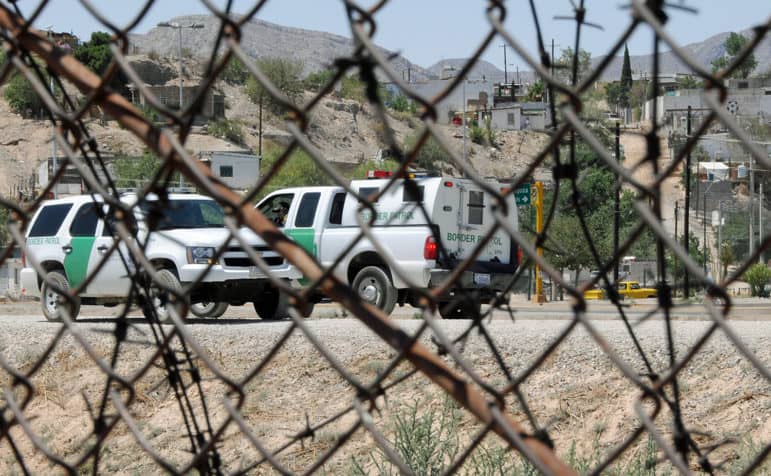
Heath Haussamen / NMPolitics.net
A scene from the U.S./Mexico border. In the foreground, behind a barbed-wire fence, U.S. Border Patrol agents speak with each other in El Paso, Texas. Across the Rio Grande, in the background, is Cuidad Juárez, Mexico.
After nearly a decade as Brooks County’s top lawman, there are two statistics that still stand out to Sheriff Urbino “Benny” Martinez: 129 and 670,000.
The first is the number of human remains discovered in the South Texas county in 2012, when a record number of undocumented immigrants perished in the brutal Texas terrain while trying to avoid contact with federal immigration officials. The second is the amount in dollars his department spent from 2009 to 2012 to transport, identify and process human remains.
“In order for things to get done correctly, there is a lot of funding involved,” he said of the costs that come with the grisly and heartbreaking task of finding bodies in his county, which is home to one of the state’s busiest Border Patrol checkpoints, straddling U.S. 281 near Falfurrias.
Help could be on the way for Martinez and his fellow officeholders if a bill filed by U.S. Sen John Cornyn, R-Texas, makes its way to President Donald Trump’s desk.
If enacted, the Missing Persons and Unidentified Remains Act of 2018 would allow local and state governments to apply for federal money under Jennifer’s Law, which allows the U.S. attorney general to give grants to state governments to help report unidentified and missing persons. Cornyn’s proposal is co-sponsored by Sen. Ted Cruz, R-Texas, and U.S. Reps. Will Hurd, R-Helotes, and Vicente Gonzalez, D-McAllen. It was introduced last week.
“Our border communities have experienced the very real consequences of the treacherous journey travelled by many seeking to come to this country,” Cornyn said in a statement. “My hope is that this bill will help local communities identify those who have gone missing, process unidentified remains, and invest in forensic equipment to provide closure to families in the United States and abroad.”
If it becomes law, counties on or close to the U.S.-Mexico border would be given priority for the grants.
The death toll among undocumented immigrants gained national notoriety in 2014 when the remains of dozens of unidentified migrants were unearthed at a cemetery in Falfurrias, the Brooks County seat. Scientists, researchers, professors and students from Baylor University and the University of Indianapolis descended on the town to aid in the excavation efforts, and found that several dozen remains were buried in nothing more than plastic bags.
Staff from the University of Indianapolis and Texas State University have since returned to the area to help county officials, and the Texas State University team is scheduled for another trip next month, Martinez said. Cornyn’s proposal could also aid in those efforts; the bill would expand grant eligibility to university anthropology laboratories and some nonprofit organizations.
Martinez said that in certain cases when the cause of death is difficult to determine, an autopsy is necessary to rule out foul play, which drives up the costs. Some bodies are discovered without any form of ID, making it difficult to identify the person and notify next of kin.
“When any individual dies and the circumstances surrounding death are unknown, the Texas Code of Criminal Procedures requires a forensic examination, collection of DNA samples, and submission of paperwork to an unidentified and missing persons database,” according to Texas State University’s abstract of its human remains project. When those procedures aren’t followed, “families are left without knowing what has happened to their son, daughter, mother, father, brother or sister.”
The proposal has bipartisan support and is backed by several nonprofit and immigrant advocates, including the South Texas Human Rights Center and the League of United Latin American Citizens.
It’s a sign that even in these contentious times, people can still come together to do what’s right, said Martinez, a Democrat.
“This is not an issue about parties, this is an issue about human beings, whether Republican, Democrat or independent, everyone is a stakeholder and everyone should come together and this [bill] is truly a good sign,” he said.
Meanwhile, he’s crossing his fingers that 2018 will be one of the slowest years in recent history for discovering human remains. So far, 47 bodies have been recovered from the Brooks County brushlands; last year they found 52 bodies.
Disclosure: The Texas State University System has been a financial supporter of The Texas Tribune, a nonprofit, nonpartisan news organization that is funded in part by donations from members, foundations and corporate sponsors. Financial supporters play no role in the Tribune’s journalism. Find a complete list of them here.